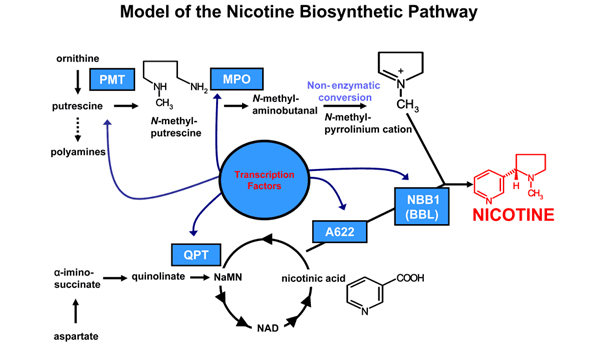Nicotine in Electronic Cigarettes: 10 Facts All Users Should Know

1. Nicotine and Cancer
It’s common for people to believe nicotine could give you cancer. This is not true – or at least there is no proof that it does. Cancer is caused by inhaling cigarette smoke. It has been suggested that nicotine could speed up the development of cancer, but this has not been proven – some studies have suggested it does, while other studies say it doesn’t!
(In an interesting aside, Christopher Snowden in his book Velvet Glove Iron Fist notes that while tobacco and nicotine have been in use for centuries, lung cancer was virtually unknown until the invention of the machine rolled cigarette in the late 19th century.)
2. Nicotine As A Posion

Nicotine is a poison, and a deadly one. If you took all the nicotine from 30/40 cigarettes, administered it to a person, and all the nicotine was absorbed, that person could die.
However, the nicotine absorbed from cigarettes or electronic cigarettes is not strong enough to poison you. (Remember the scientist’s adage – the poison is in the dose!) Most of the nicotine in a cigarette is destroyed or burned, and e-cigarettes seem to deliver slightly less nicotine than a regular cigarette (see point 10). Most nicotine poisonings that have occurred have been caused by insecticide or by harvesting tobacco, or from nicotine patches handed out by anti-smoking clinics to children.
That said, here are a couple of points to bear in mind:
• Keep e-liquid and e-cigarettes away from your children, especially very young children and toddlers, who are more susceptible to nicotine poisoning
• Only use e-liquid from respectable suppliers – good suppliers batch test e-liquid and cartridges to ensure safety. In the UK, look for the ECITA standard of excellence logo.
Read More: Is Nicotine Poisoning Possible With E-Cigarettes?
3. What Else Is Bad About Nicotine?

While we do not know everything about nicotine, according to tobaccoharmreduction.org its health effects are similar to caffeine.
Both cause a temporary increase in blood pressure, and both can increase the pulse rate, and nicotine may also have an effect on foetal development.
4. Nicotine Is Really Addictive — Or Is It?

Some scientists have maintained that nicotine is more addictive than heroin.
However, the science is really not clear cut here. Some studies found that when you have no chance of getting a cigarette, your nicotine cravings decrease. For example, when Jewish smokers observe the Sabbath and refrain from smoking, their urge to smoke a cigarette also decreases.
Another study found that the physiological act of lifting the cigarette to your mouth and taking a puff has been vastly underestimated – perhaps deliberately, as most cessation studies are funded by pharmaceutical companies who sell nicotine cessation aids.
David Kroch, in his book Smoking, The Artificial Passion, has another interesting point to make. Whereas morphine and cocaine were rapidly adopted as drugs of ‘abuse’ when produced in a pure form, nicotine, stripped from tobacco, has rarely been popular.
Perhaps it’s not surprising, then, that Professor Siegel has argued:
It appears that the role of nicotine in addiction to smoking has been exaggerated and that there are behavioral aspects to the addiction that play a very important role.
5. A Stimulant – AND a Relaxant!

Nicotine is biphasic – it both stimulates and relaxes you. Take a little and it stimulates you – more than that, it can accentuate the mood of the moment, heightening your awareness of pleasure. Take a lot, though, and it can help calm and relax you in stressful situations.
6. Nicotine and Brain Damage

According to at least one study, nicotine has been found to stimulate recovery from brain damage. Unfortunately, other studies argue that nicotine also causes permanent changes to the brain, especially if used from an early age.
7. Nicotine and Memory

Nicotine may also help your memory. This is a controversial area, because once again some studies find it does help prevent Alzheimers and improve memory, while at least one study argues that it accelerates the growth of Alzhimer’s by encouraging the growth of tangles in the brain.
A more recent study found that nicotine patches helped patients with mild cognitive impairment gain 46% of normal performance, while a test group who did not receive nicotine declined by 26% in the same period.
8. Nicotine, Agression and Concentration

According to several studies (conducted on both monkeys and humans), nicotine can lower your aggression levels and improve your concentration. Indeed, one study by Kjelerup found that nicotine decreases your level of aggression, make your brain up to 30% smarter and makes you less aggressive in stressful situations.
9. Nicotine and Hunger

Nicotine can make you feel less hungry. In fact, as Paul Bergen has argued on this blog, this may have been one of the reasons why tobacco originally became so popular at a time when people were often hungry.
10. Electronic Cigarettes and Nicotine Delivery

Early studies found that electronic cigarettes did not deliver as much nicotine as cigarettes do.
I believe that newer models of e-cigarettes deliver more nicotine than older models. This is borne out not just by the hit we users get today with e-cigarettes, but by two studies carried out by Dr Eissenburg: the first found that e-cigarettes did not deliver nicotine, the second that they did.
However, it is likely that electronic cigarettes do deliver rather less nicotine than regular cigarettes, and we always advise smokers to use e-liquid/cartridges that is one strength above what they are used to smoking.
